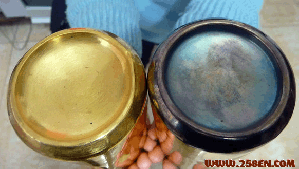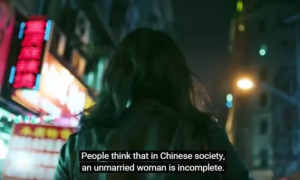
Two "golden cans" awarded by Jianlibao, a Guangdong-based soft drink company are displayed by their recipient Gao Min, a former Olympic diving champion, in her hometown of Zigong city, Southwest China's Sichuan province, Nov 12, 2011. The cans were alleged to be made of pure gold and were presented as rewards to China's Olympic champions in 1992 (L) and 1988. The base of the 1988 can has turned black and, according to Gao, tests have proven that it is fake. "They said it was made of 125-grams of pure gold in a news reference material released in 1988," Gao said, adding the 1992 can also lacks the gold content claimed by the company. Three other Olympic champions have also come forward about their problematic "golden cans" recently, and Zhuang Xiaoyan, a 1992 Olympic judo champion has said she will take legal action after tests revealed her prize was a fake and worth only 50 yuan ($7.90). The company has not responded to the athletes' allegations.
2011年11月12日,广东软饮料健力宝公司颁发的两个金罐被被授予者高敏,上届奥林匹克运动会跳水冠军,在她的家乡中国四川省自贡市展示出来。当时金罐被宣称为纯金打造,并且分别在1992年和1988年被用来作为颁发给中国奥运冠军的奖品。1988年颁发的金杯现在已开始变黑,并且根据高所说,已经有测试证明金罐是赝品。“他们在1988年发布的新闻参考资料里说过,金杯是由125克纯金制造而成。”高说,并且补充称1992年颁发的金罐也不像健力宝公司所声称的那样含有足够的黄金量。最近,另三名奥林匹克冠军也出面谈及他们的问题金罐,1992年奥林匹克柔道冠军庄晓岩表示测试显示她的奖品是假的,并且只值50元(7.9美元),她将会采取法律手段。健力宝公司对运动员的诉称没有做出任何反应。







